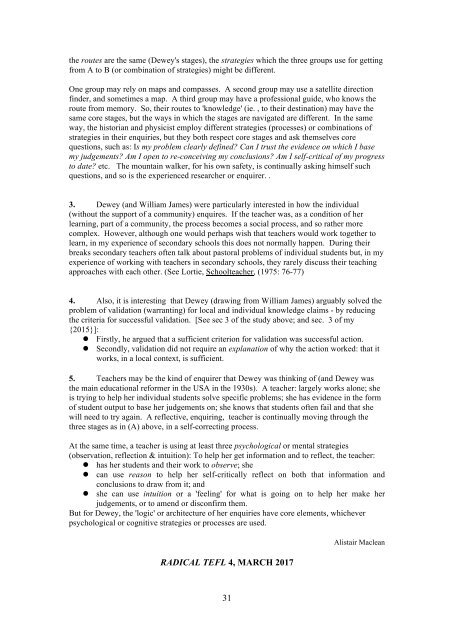RADICAL TEFL
2hqhXJd
2hqhXJd
You also want an ePaper? Increase the reach of your titles
YUMPU automatically turns print PDFs into web optimized ePapers that Google loves.
the routes are the same (Dewey's stages), the strategies which the three groups use for getting<br />
from A to B (or combination of strategies) might be different.<br />
One group may rely on maps and compasses. A second group may use a satellite direction<br />
finder, and sometimes a map. A third group may have a professional guide, who knows the<br />
route from memory. So, their routes to 'knowledge' (ie. , to their destination) may have the<br />
same core stages, but the ways in which the stages are navigated are different. In the same<br />
way, the historian and physicist employ different strategies (processes) or combinations of<br />
strategies in their enquiries, but they both respect core stages and ask themselves core<br />
questions, such as: Is my problem clearly defined? Can I trust the evidence on which I base<br />
my judgements? Am I open to re-conceiving my conclusions? Am I self-critical of my progress<br />
to date? etc. The mountain walker, for his own safety, is continually asking himself such<br />
questions, and so is the experienced researcher or enquirer. .<br />
3. Dewey (and William James) were particularly interested in how the individual<br />
(without the support of a community) enquires. If the teacher was, as a condition of her<br />
learning, part of a community, the process becomes a social process, and so rather more<br />
complex. However, although one would perhaps wish that teachers would work together to<br />
learn, in my experience of secondary schools this does not normally happen. During their<br />
breaks secondary teachers often talk about pastoral problems of individual students but, in my<br />
experience of working with teachers in secondary schools, they rarely discuss their teaching<br />
approaches with each other. (See Lortie, Schoolteacher, (1975: 76-77)<br />
4. Also, it is interesting that Dewey (drawing from William James) arguably solved the<br />
problem of validation (warranting) for local and individual knowledge claims - by reducing<br />
the criteria for successful validation. [See sec 3 of the study above; and sec. 3 of my<br />
{2015}]:<br />
l Firstly, he argued that a sufficient criterion for validation was successful action.<br />
l Secondly, validation did not require an explanation of why the action worked: that it<br />
works, in a local context, is sufficient.<br />
5. Teachers may be the kind of enquirer that Dewey was thinking of (and Dewey was<br />
the main educational reformer in the USA in the 1930s). A teacher: largely works alone; she<br />
is trying to help her individual students solve specific problems; she has evidence in the form<br />
of student output to base her judgements on; she knows that students often fail and that she<br />
will need to try again. A reflective, enquiring, teacher is continually moving through the<br />
three stages as in (A) above, in a self-correcting process.<br />
At the same time, a teacher is using at least three psychological or mental strategies<br />
(observation, reflection & intuition): To help her get information and to reflect, the teacher:<br />
l has her students and their work to observe; she<br />
l can use reason to help her self-critically reflect on both that information and<br />
conclusions to draw from it; and<br />
l she can use intuition or a 'feeling' for what is going on to help her make her<br />
judgements, or to amend or disconfirm them.<br />
But for Dewey, the 'logic' or architecture of her enquiries have core elements, whichever<br />
psychological or cognitive strategies or processes are used.<br />
<strong>RADICAL</strong> <strong>TEFL</strong> 4, MARCH 2017<br />
Alistair Maclean<br />
31


